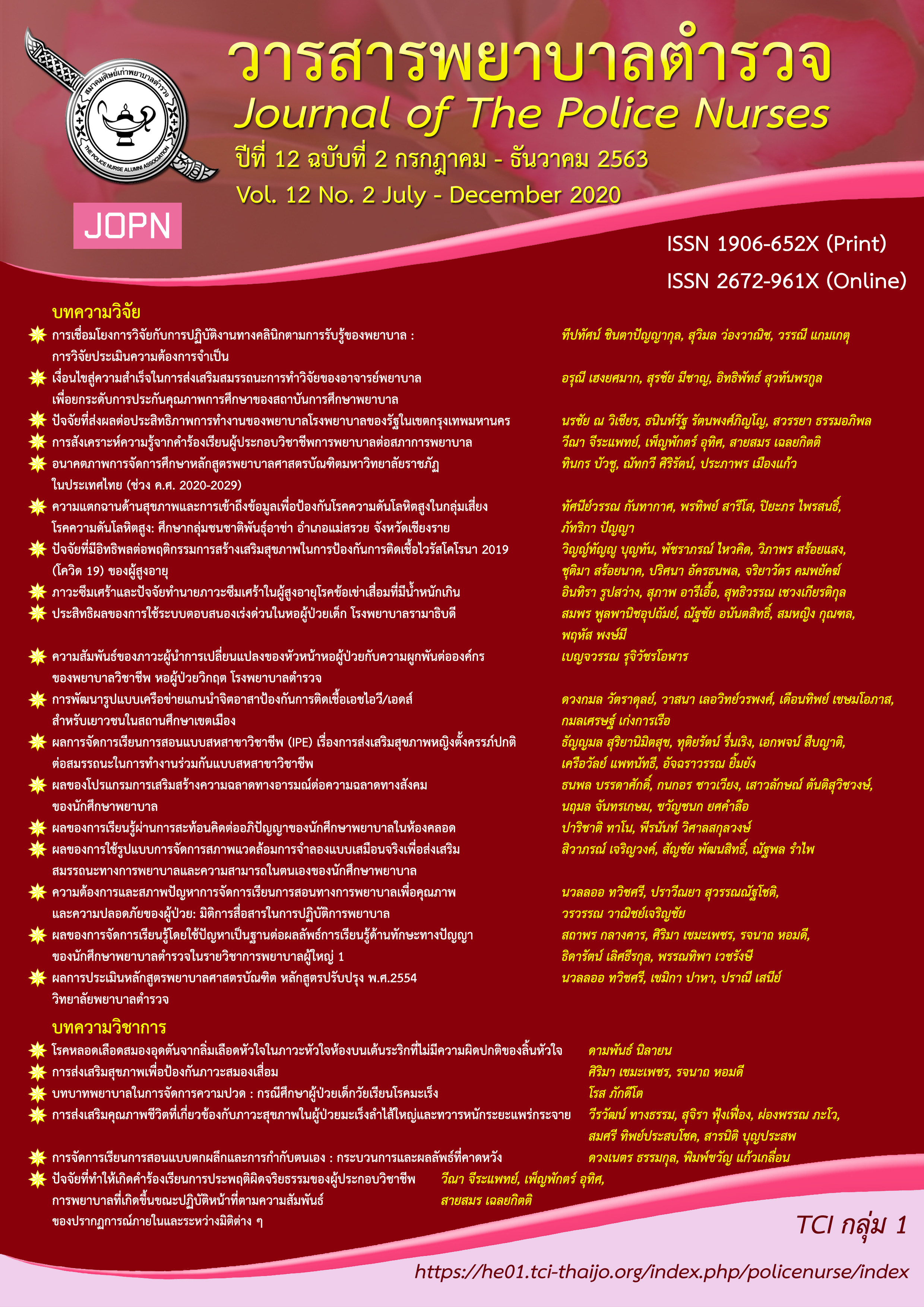HEALTH LITERACY AND ACCESSIBILITY TO HEALTH INFORMATION OF GROUP AT RISK OF HYPERTENSION: STUDY IN AKHA COMMUNITY AT MAE SUAI DISTRICT, CHIANGRAI PROVINCE
Keywords:
hill tribe, health literacy, accessibility to information, hypertensionAbstract
This qualitative research aims to examine health literacy and ability to the accessibility to health information among the Akha hill tribe. The study was carried out in the hill tribe village located in Mae Suai, Chiang Rai, Thailand. The data were collected by using a focus group with semi-structured interview related to health literacy and accessibility to health information, field note and audio-recording. The questionnaires used in the interview were examined the consistency of the questions and research objectives by 3 experts. Thirteen informants were selected based on the purposive selection technique. The informants were the persons who were at risk of hypertension. Data were recorded, transcribed word-for-word and analyzed using van Kamm’s method.
The results revealed 3 domains. First, for that health behavior related to preventing hypertension scope, the informants had constantly had high fat meals and not done enough exercise. Second, for the health literacy related to hypertension and skills necessary to prevent hypertension aspect, it was found that the informants had the basic knowledge for preventing hypertension, but did not have the necessary skills to change their behavior to prevent hypertension. Moreover, communication about health to prevent hypotension was one-way communication. Third, on the topic of accessibility to health information related to preventing hypertension, it was found that informants did not know how to find information and lack adequate tools for searching. Therefore, health care providers should continue to promote access to online media related to health information for Akha people to increase their ability to retrieve health-related information.
Downloads
References
Aekplakorn, W., Hathaichanok, P., Kanittha, T., & Warapone, S. (2016). the 5th National health examination survey, 2557. Nonthaburi: Health System Research Institute.
Akbarpour, S., Khalili, D., Zeraati, H., Mansournia, M. A., Ramezankhani, A., & Fotouhi, A. (2018). Healthy lifestyle behaviors and control of hypertension among adult hypertensive patients. Scientific reports, 8(1), 1-9.
Altin, S. V., & Stock, S. (2016). The impact of health literacy, patient-centered communication and shared decision-making on patients’ satisfaction with care received in German primary care practice. BMC Health Service Research, 16. doi:10.1186/s12913-016-1693-y
Arahung, R., Hoontrakul, S., & Roojanavech, S. (2019). The effects of health literacy enhancement program of hypertensive prevention behavior of pre-hypertension risk group at a community in Nakhon Pathom Province. Royal Thai Navy Medical Journal, 45(3), 509-526.
Arphonpisan, P., Thirasirikul, J., & Siriwanarangsun, P. (2019). Policy management factor affecting access to health service management of transnational labours in Thailand, Journal of Social Academic, 11(3), 307-316.
Chajaee, F., Pirzadeh, A., Hasanzadeh, A., & Mostafavi, F. (2018). Relationship between health literacy and knowledge among patients with hypertension in Isfahan province, Iran. Electron Physician, 10(3), 1-8.
Choeisuwan, V. (2017). Health literacy: Concept and application for nursing practice. Royal Thai Navy Medical Journal, 44(3), 183-197.
Division of Non communicable disease. (2020). Number and rate of patients in 2016 - 2018 (hypertension, diabetes mellitus, coronary heart disease, cerebrovascular disease, COPD). Retrieved from http://thaincd.com/index.php
Kaewtong, N., Termsirikulchai, L., Leelaphul, P., Kengganpanich, T., & Kaeodumkoeng, K. (2014). Health literacy of group at risk of hypertension at Ban Nonghoi sub-district health promoting hospital, Sa Kaeo province. Journal of Boromarajonani College of Nursing, Bangkok, 30(1), 45-56.
Khumtong, T., Potisiri, W., & Kaedumkoeng, K. (2016). Factors influencing health literacy for people at risk of diabetes mellitus and hypertension of Uthai Thani and Ang Thong. Veridian E-Journal, 3(6), 67-85.
Kooariyakul, A., & Meesri, C. (2017). Knowledge and self-care behavior of patients with hypertension at Tambon Pasao health promoting hospital, Ampur Muenang, Uttaradit province. Uttaradit Boromarajonani College of Nursing, Uttaradit Journal, 9(2), 28-40.
Malik, A., Yoshida, Y., Erkin, T., Salim, D., & Hamajima, N. (2014). Hypertension-related knowledge, practice and drug adherence among inpatients of a hospital in Samarkand, Uzbekistan. Nagoya journal of medical science, 76(3-4), 255.
Manganello, J. A. (2008). Health literacy and adolescents: A framework and agenda for future research. Health education research, 23(5), 840-847.
Manotham, M., Koychusakun, P., Choyae, A., Maneerat, W., Muangmool, J., & Vanishprinyakul, S. (2018). Healthcare knowledge and practice of Akha ethic group: Case study at a Mae-mon Village, TambooHuay-chom-poo, AmphurMuang, Chiang Rai. Journal of Health Science Research, 12(1), 111-120.
McNaughton, C. D., Jacobson, T. A., & Kriplani S. (2014). Low literacy is associated with uncontrolled blood pressure in primary care patient with hypertension and heart disease. Patient education and Counselling, 96(2), 165-170.
Ngamampornnara, P. (2017). Health literacy for patients with type 2 diabetes in Bangkok metropolis andperimeter (Master of Science Program in Sports Science). Faculty of Sport Science, ChulalongkornUniversity, Bangkok.
Punyathanachaikhul, K., Mollsart, S., & Chailimpamontree, W. (2020). The effectiveness of a health literacy development program in hypertension patients risking to chronic kidney disease. Nursing Public Health and Education Journal, 21 (1), 42-63.
Rowlands, G., Whitney, D., & Moon, G. (2018). Developing and applying geographical synthetic estimates of health literacy in GP clinical systems. International Journal of Environmental Researchand Public Health, 15(8), 1-8.
Sany, S. B. T., Behzhad, F., Ferns, G., & Peyman, N. (2020). Communication skills training for physicians improves health literacy and medical outcomes among patients with hypertension: A randomized controlled trial. BMC health services research, 20(1), 60.doi:10.1186/s12913-020-4901-8
Schoenthaler, A., Chaplin, W. F., Allegrante, J. P., Fernadez S., Diaz-Gloster, M., Tobin, J. N., . . . Ogedegbe, G. (2009). Provider communication effects medication adherence in hypertensive African Americans. Patient Education and Counselling, 75(2), 185-191.
Thai Hypertension Society. (2015). Thai guidelines on the treatment of hypertension 2012 update 2015. Retrieved from http://www.thaihypertension.org/files/2015%20Thai%20Hypertension%20Guideline.pdf
Wannapakae, J., & Phatisena, T. (2019). Relationship between health literacy and personal factorswith health behavior among risk group with hypertension in Talad sub-district, Muang district, Nakhon Ratchasima province. Journal ofSuvannaphumi of Technology (Humanities andSocial Science), 12(3), 176-185.
Downloads
Published
How to Cite
Issue
Section
License
ผลงานที่ได้ตีพิมพ์แล้วจะเป็นลิขสิทธิ์ของวารสารพยาบาลตำรวจ















